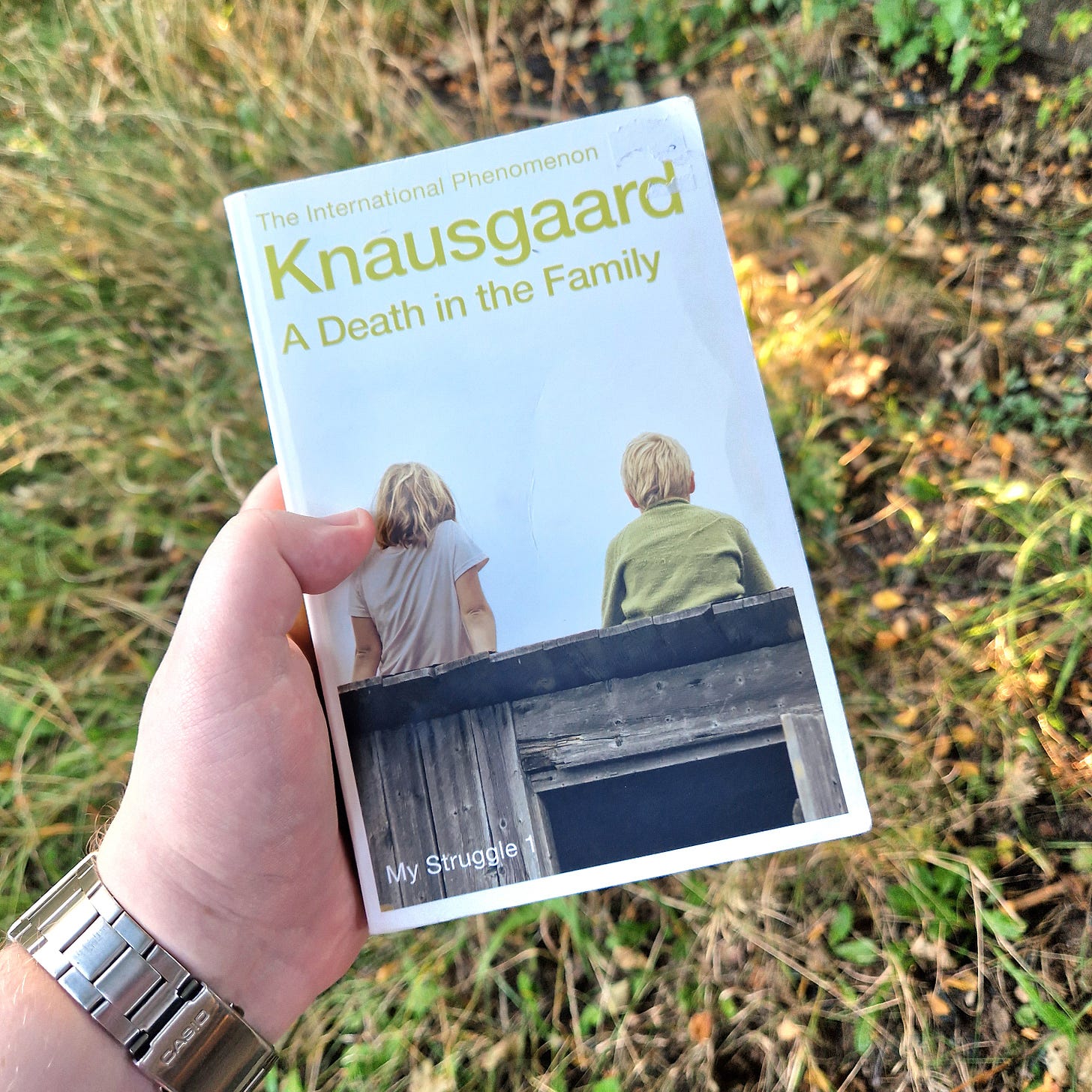Karl Ove Knausgaard, born 1968, published this book in 2009 and subsequently became a national talking point in Norway. Media outlets went on a frenzy to find and interview the people who appear in this book, many of whom have become estranged to Karl and even tried to sue him for exposing their private lives.
Excited yet? Well, don't get ahead of yourself, the next paragraphs may bore you.
While A Death in the Family is supposed to be a fiction book, you should consider this more of a memoir. Knausgaard's first-person writing style reads like listening to someone talk, and Karl... talks a lot. The first half of the book, in particular, had me convinced that this was nothing more than the confessions of a boy with not a lot to say.
I was reminded of Amor Towle's "A Gentleman in Moscow" but without the personality of Count Alexander Rostov stimulating me. A list of little things. Descriptions of making coffee, smoking cigarettes and meeting friends. These things are not exciting and they are not "good fiction", such is, I eventually realised, the point. Karl utilises the tediousness of life in order to keep the human connection as honest as possible. He is a realist in the truest sense: unfiltered and complete.
The slog pays off when we see Karl Ove as an adult. It is at this point where something profound happens. Something clicks and you begin to understand the necessity for all of the boring bits. Karl's early years are unedited. His character is one of typical teenage embarrassment, a vanilla life. There is no pretense and no heroic metaphore, just a young man surviving until something shakes him: the day of his father's death. It is an event that would carry much less weight without the context of normal, dull, perpetual life.
This is where it gets rewarding. The filthy house his father died drunkenly in; the incontinent vodka scoffing grandmother who lived and drank with him; the rot, the slime, the agony. These are the bits that set my brain tingling with its masochistic fetish for foulness. I gorged on the grime and uneasiness as Karl Ove and his brother Yngve (don't ask me how that's pronounced) put on some Marigolds and got to cleaning, all the while reminiscing on faded childhood memories with a zombielike brain fog and held back tears for a man they didn't like. It is as though something had reawakened in Karl, a background noise invading his current consciousness. He became reflective and brooding, a more interesting character in all.
“Now I saw his lifeless state. And that there was no longer any difference between what once had been my father and the table he was lying on, or the floor on which the table stood, or the wall socket beneath the window, or the cable running to the lamp beside him. For humans are merely one form among many, which the world produces over and over again, not only in everything that lives but also in everything that does not live, drawn in sand, stone, and water. And death, which I have always regarded as the greatest dimension of life, dark, compelling, was no more than a pipe that springs a leak, a branch that cracks in the wind, a jacket that slips off a clothes hanger and falls to the floor.”
The grandmother, in particular, was a fascinating feature. Her senility was interrupted occasionally by clarity that gave me the sense that she was holding something back, something guiltridden and interesting. I would love to read the same book from her perspective. Her story, despite the repetitiveness of her alcohol fueled days, would never have bored me. I like to imagine her as a female Charles Bukowski after he's become too old to pick up chicks.
While my opinion of this book differed from first to second half, I'd like to conclude by saying that this was in fact a very good read. I almost wrote that this book was genius, but I think I'd like to let it stew for a decade or two before deciding. Maybe ill read the next in the series before I commit.





This is the level of dysfunctional that I enjoy. Plus your review's lyrical wizardry has me wanting to read it even more!
“These are the bits that set my brain tingling with its masochistic fetish for foulness. I gorged on the grime and uneasiness...”
Lol!
You read it, Adam! This makes me very happy and I’m glad that you liked it even though you found some parts boring. I liked it from begging to end but maybe it was because I had listened to it.
Try listening to the second book. The narrator, Edoardo Ballerini, is fantastic. By far my favorite narrator and I listen to a lot of books. I wouldn’t be surprised if my enjoyment of these books wouldn’t be diminished if I had to read them instead of listening. Ballerini is that good.